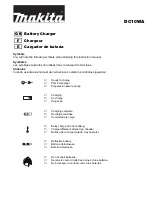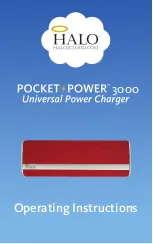
d) Connecting batteries to the charger
Never attempt to connect more than one battery to a charging output at the same
time. This may damage or even destroy the charger.
• For each charging channel (1-6), only connect one battery with one type of connector to
the possible battery connections (1, 2, 3 & 4). Select the appropriate connector (Micro, MX,
MCPx and JST) for each of the six channels and connect up to a maximum of six batteries
to the charger.
• Charging will start after the batteries have been connected.
e) Charging process
• During the charging process, the LED indicator (3) for the corresponding charging channel
will flash in red. The LCD display shows the charging parameters for all connected batteries
in an automatic loop . The parameters are displayed in the following order: Battery type >
Battery voltage > Charging current > Battery capacity
• As soon as a battery is fully charged, "FULL" will be displayed for the corresponding positi-
on. The LED indicator (3) will then stay constant green.
Safety features
a) Undervoltage/overvoltage protection for the input voltage
When the DC input voltage is below 7.0 V/DC, the charger will stop charging and the LCD
display will show the message "DC Input Low".
If you are using a rechargeable battery for the power supply, remove it as soon
as possible and recharge it later. Otherwise, check your connected power unit to
ensure that the voltage setting is not too low and verify whether there are any other
malfunctions.
If the DC input voltage is above 17.0 V/DC, the charger will also stop the charging process and
the LCD display will show the message "DC Input High".
If this message appears, immediately adjust the input voltage to the correct value or
disconnect the charger from the voltage source (battery). Prolonged overvoltages
pose a significant risk of fire and may destroy the charger.
b) Reverse polarity protection
If you connect a battery with reversed polarity, the charger will not charge. Connect the rechar-
geable battery(s) with the correct polarity.
c) Cell overvoltage
As soon as the cell voltage is above the value of 50 mV (saturation voltage), the charger
automatically stops charging and displays an "OV" warning message for the corresponding
channel.
d) Overcurrent
If the charging current is above 1.20 A, the charger automatically stops charging and displays
an "OC" warning message for the corresponding channel.
Care and cleaning
Never use aggressive detergents, rubbing alcohol or other chemical solutions, as
these may damage the housing or stop the product from functioning properly.
• Disconnect the product from the power supply before cleaning. Pull the mains plug from the
mains socket or disconnect the DC power supply.
• Use a dry, lint-free cloth to clean the product.
• To prevent scratch marks, do not press too hard on the surface of the enclosure or LCD
display when cleaning.
Disposal
Electronic devices are recyclable waste and must not be placed in household waste.
At the end of its service life, dispose of the product according to the relevant statu-
tory regulations.
You thus fulfil your statutory obligations and contribute to environmental protection.
Technical data
Input voltage ................................. 100 - 240 V/AC, 50 Hz or 7 - 17 V/DC
Output voltage .............................. Max. 4.35 V
Charging power ............................ 6 x 4.35 W ± 10%
Charging current ........................... 6 x 0.1 - 1.0 A ± 10%
Battery connector types ................ MX, JST, mCPX, Micro
Cable length ................................. 1,23 m
Suitable for ................................... LiPo, LiHV
Operating conditions ..................... 0 to +40 °C, 0–90 % relative humidity (non-condensing)
Storage conditions ........................ -20 to +60 °C, 0–90 % relative humidity (non-condensing)
Dimensions (L x W x H) ................ 122 x 68 x 42 mm
Weight .......................................... 227 g
This is a publication by Conrad Electronic SE, Klaus-Conrad-Str. 1, D-92240 Hirschau (www.conrad.com).
All rights including translation reserved. Reproduction by any method, e.g. photocopy, microfilming or capture in electronic
data processing systems, requires the prior written approval of the publisher. Reprinting, also in part, is prohibited. This
publication reflects the technical status at the time of printing.
Copyright 2021 by Conrad Electronic SE.
*2267183_v4_0121_02_DS_m_2L_1
























